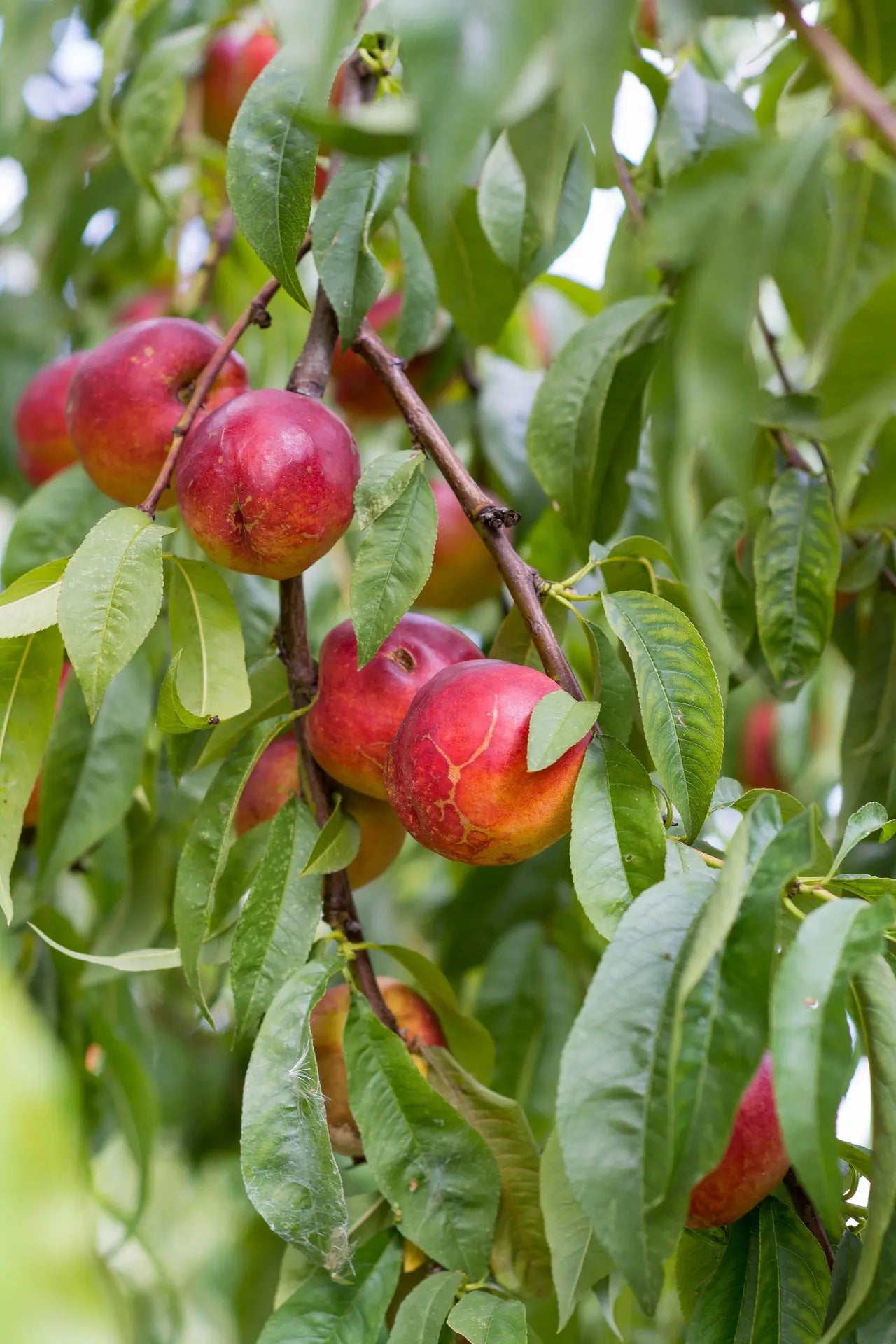-
Delivery from 10 plants to France, Switzerland and Europe
Delivery method -
Fruit Tree Wholesale Supplier
About Us -
Quality Fruit Tree Plants
Technical itinerary
BN1066-1-cov Yellow Flesh Nectarine Tree grafted on RP-40 bare-root 100-120 cm
BN1066-1-cov Yellow Flesh Nectarine Tree grafted on RP-40 bare-root 100-120 cm
The prices shown are our base prices for large volumes. Depending on the quantity ordered and the producers’ pricing scales, the rate may be adjusted upward. Each quote is personalized to ensure you receive a fair price.
Mini order 50 units / Multiple orders 10 units (FRSHER202503001)
Couldn't load pickup availability
 Buy now and get it delivered when you're ready to plant - Add your desired date to your quote request
Buy now and get it delivered when you're ready to plant - Add your desired date to your quote request
- Delivery from 10 plants to France, Switzerland and Europe

Quick read / the essentials on Nectarinier BN1066-1-cov
The BN1066-1-cov nectarine tree is a recent yellow-fleshed variety, protected by a Plant Variety Certificate (PVC), which is one of the most promising selections on the fresh market. Designed to meet the expectations of fruit growers in terms of taste quality, post-harvest stability and attractive presentation, this cultivar combines the advantages sought after in modern nectarines: firmness, size and aromatic balance.
Despite a lack of public agronomic data at this stage, it is likely that BN1066-1-cov has an A to AA size , sweet and juicy flesh , as well as a homogeneous red skin that is particularly valuable on the shelves. Like the majority of yellow-fleshed varieties, it is geared towards high-end fresh consumption and offers good potential in long or specialized circuits.
Arborists wishing to purchase BN1066-1-cov nectarine plants must contact a specialist nectarine plant wholesaler , the only one authorized to legally distribute this variety under license. Arboriverse , recognized as a specialist nectarine plant wholesaler , offers technical support tailored to your needs to plant this variety in the best conditions. To secure your first plantings and enhance your production from the first campaigns, do not hesitate to purchase BN1066-1-cov nectarine plants from a leading player in the sector.
Presentation of the variety Nectarine with yellow flesh BN1066-1-cov
The BN1066-1-cov variety is a recent yellow-fleshed nectarine tree, protected by a Plant Variety Certificate. This regulatory statement indicates that the variety benefits from exclusive reproduction and marketing rights, which partly explains the scarcity of technical information available in public sources. As with other recent varieties, specific data is generally held by the breeder or licensed nurserymen.
Fruit characteristics
BN1066-1-cov produces yellow-fleshed nectarines, typical for their sweet taste and juicy texture. This category of fruit is highly valued for fresh consumption, particularly due to its firmness and handling properties. Although a precise description of the fruit is not available, the general characteristics of yellow-fleshed nectarines suggest a well-colored fruit, probably red to dark red, with smooth skin and a round to slightly oblong shape.
Fruit size is not specified. However, in most cases for this type of variety, we can expect category A to AA fruit. Controlled thinning can help to obtain better-sized fruit, especially in intensively managed orchards.
Taste quality and conservation
Specific flavor data for BN1066-1-cov have not been disclosed. However, yellow-fleshed nectarines are generally distinguished by an intense flavor, marked sweetness, and sometimes a balancing touch of acidity. This taste quality makes them a product of choice in retail and short-circuit markets.
Post-harvest shelf life is not documented, but good shelf life can reasonably be assumed if the fruit has adequate firmness, as is often the case with modern yellow-fleshed varieties.
Phenology and vegetative behavior
The earliness of BN1066-1-cov is not defined, making it difficult to position this variety in the harvest calendar. Fruiting of nectarines typically occurs between July and September depending on the variety. In the absence of more precise indications, direct observation in the orchard or consultation of agronomic trials remains the best option.
No information is available on the tree's vigor or growth habit. However, like most nectarine trees, a mature height of 3 to 5 meters, medium to strong vigor, and a semi-open habit can be expected. Staking is recommended during the first few years to ensure a balanced structure and prevent wind-related breakage.
Fertility and pollination
No explicit confirmation is given on the self-fertility of BN1066-1-cov. However, the majority of modern nectarine varieties are self-fertile. It is likely that this variety is also self-fertile, although only confirmation from the breeder can validate this. In the presence of other nectarine or peach varieties nearby, an improvement in fruit set rate may be observed due to cross-pollination.
Resistance and health constraints
Information on resistance to diseases (curl, powdery mildew, monilia) or pests (aphids, flies) is not available. In the absence of specific data, standard vigilance must be maintained: preventive treatments in the orchard, regular monitoring, integrated pest management.
Regarding abiotic constraints, nectarine trees are generally sensitive to very calcareous soils (iron chlorosis) and root asphyxiation. Well-drained soil and sunny exposure remain fundamental requirements. The use of rootstocks adapted to these conditions is therefore an essential technical lever.
Rootstock compatibility
Although BN1066-1-cov does not have any specific published recommendations, several rootstocks are traditionally compatible with nectarine cultivation in France. The choice must be made based on the nature of the soil, the climate, and the desired management method. The main suitable rootstocks include:
-
GF 677 : vigorous, limestone tolerant, suitable for dry soils
-
Cadaman Avimag : vigorous, good tolerance to root asphyxiation
-
Garnem : vigorous, resistant to nematodes
-
Montclar : medium vigor, suitable for light soils
-
Julior Ferdor : medium vigor, suitable for heavy soils
-
Rootpac 20 : dwarfing, suitable for dense plantations
-
Adesoto : good adaptation to clay and limestone soils
Performance and business opportunities
Expected yield is not specified for BN1066-1-cov. Under conventional cultivation, a well-managed adult nectarine tree can produce between 25 and 68 kg of fruit per year. Yields will depend on the choice of rootstock, growing conditions, irrigation management, pruning, and of course, the earliness and vigor of the variety.
In the absence of a clear positioning for processing, this variety is primarily intended for fresh consumption. Its likely good firmness and attractive color could make it competitive in wholesale markets or specialized distribution channels.
Perspectives and recommendations
BN1066-1-cov is a variety whose full characteristics remain to be validated through orchard trials and observation over several growing cycles. Its status as a protected variety requires direct consultation with the breeder or an approved nurseryman to obtain detailed data.
For producers wishing to integrate BN1066-1-cov into their range, it is recommended to carry out a test planting on a small area, to closely monitor the agronomic behavior and to participate, if possible, in variety testing networks.
To summarize: Nectarine BN1066-1-cov
The BN1066-1-cov variety offers an opportunity to integrate into your orchard a potentially productive, qualitative yellow-fleshed nectarine that is perfectly suited to current market expectations. While agronomic data is still limited, the classic characteristics of this fruit category suggest a balanced profile between post-harvest stability , firmness , AA-A size , and a sweet and fragrant flavor .
Its COV status guarantees secure genetics and controlled supply, key elements for professionals seeking reliability and consistency. To successfully integrate this variety, it is advisable to adapt the choice of rootstock (GF 677, Cadaman, Garnem, etc.) to the specific characteristics of your plot.
Whether you are in the process of diversifying or renewing your orchard, buying BN1066-1-cov nectarine plants is a strategic option, especially if you rely on a wholesale supplier specializing in nectarine plants . Thanks to its expertise, Arboriverse , a wholesale supplier specializing in nectarine plants , provides you with reliable and regulatory-compliant planting solutions.
In the introduction or variety testing phase, buying BN1066-1-cov nectarine plants also allows for local testing of vigor, production regularity and phytosanitary behavior, all key factors to evaluate over several campaigns before generalizing this high-potential variety.
-
BN1066-1-cov Yellow Flesh Nectarine Tree grafted on Garnem bare-root 100-120 cm
Regular price €5,95 EURRegular priceUnit price / per -
BN1066-1-cov Yellow Flesh Nectarine Tree grafted on RP-40 bare-root 100-120 cm
Regular price €6,55 EURRegular priceUnit price / per -
BN1066-1-cov Yellow Flesh Nectarine Tree grafted on PR-R/Mirared bare-root 100-120 cm
Regular price €6,15 EURRegular priceUnit price / per -
BN1066-1-cov Yellow Flesh Nectarine Tree grafted on GF677 and Mirab.29-C bare-root 100-120 cm
Regular price €5,75 EURRegular priceUnit price / per -
BN1066-1-cov Yellow Flesh Nectarine Tree grafted on Garnem 1L pot
Regular price €6,25 EURRegular priceUnit price / per -
BN1066-1-cov Yellow Flesh Nectarine Tree grafted on RP-40 1L pot
Regular price €6,85 EURRegular priceUnit price / per



